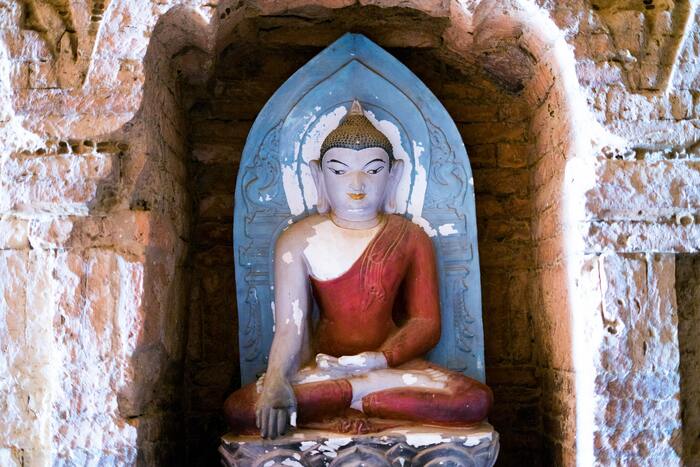
Compassion – the wish for others to be free from suffering and its causes – is one of humanity's most beautiful qualities. However, while compassion as a thought is uplifting, it becomes truly powerful when we actually put it into action. Compassion in action, then, is the embodiment of our deepest values as Buddhist practitioners. It is a tangible expression of our commitment to the well-being of all beings. When we transform our compassionate intentions into actual, meaningful actions, we can bring relief to the world around us. Could there be anything more meaningful?
Why Compassion Must Be Put into Action
Transforming Suffering into Relief
The first of the four noble truths teaches that life, from birth to death, is filled with suffering and dissatisfaction. Along with wisdom, compassion is an antidote to this suffering. However, compassion in its fullest sense doesn’t stop at just understanding or empathy – it demands action. By putting compassion into action, we can directly alleviate the suffering of others. Whether it’s through helping a friend in need, supporting a cause, or simply being present for someone who is struggling, our compassionate actions can make a huge difference in the lives of others. Compassion in action also transforms us. When we engage in acts of kindness, we slowly cultivate a heart that is generous and open to the world.
Creating Positive Karmic Potential
In Buddhism, the intentions of our actions are crucial. Actions motivated by genuine compassion generate positive potential, which the Buddha said leads to future happiness. When we act out of compassion, we sow seeds of kindness that will bear fruit in our own lives and in the lives of others. Compassionate action also breaks the cycle of destructive potentials. By repeatedly responding to situations with kindness and understanding, rather than anger or selfishness, we begin to habituate our minds and hearts to constructive actions, until they become second nature. This leads to greater inner peace and a clearer path toward enlightenment.
Understanding Interconnectedness
Compassion in action helps us to recognize the interconnectedness of all beings. There is not a single being in the universe that wakes up wishing for misery; all of us wish for happiness equally. When we act with compassion, we acknowledge that we are all part of this larger whole and that the happiness and suffering of others are intimately linked to our own. This awareness fosters within us a sense of unity. It breaks down the barriers of separation and isolation that so often cause suffering. In a world that often feels divided, compassion in action is a powerful force that reminds us that we are all in this together and that, by supporting one another, we can create a more harmonious world.

Ways to Put Compassion into Action
Generosity
Generosity, the first of the six far-reaching attitudes, is one of the best ways to practice compassion in action. This can take many forms, such as offering material support to those in need if we are able to. We can also share our time and energy in a wide variety of ways. In Buddhism, giving is not just about the receiver; it is also about the giver. When we give with a pure and happy heart, and especially if we can give without any hope of receiving something in return, then we let go of our own desires and open ourselves up to the joy of selflessness.
Offering Emotional Support and Comfort
Have you noticed that when someone is going through a difficult time, they often don’t need advice – they just need someone by their side? Sometimes, the most compassionate thing we can do is simply to be present. Offering emotional support – kind words, a hug, or just listening without judgment – can provide immense comfort and relief. This type of compassionate action does not require grand gestures; often, it is these small acts of kindness that make the biggest difference. By being there for others in their times of need, we show that we care and that they are not alone.
Volunteering in the Community
Volunteering is another way in which we can put compassion into action. In most places, there are a lot of opportunities: for instance, helping at a food bank or participating in a community clean-up. Volunteering allows us to directly contribute to the well-being of others and also gives us a strong sense of purpose in life. By dedicating our time and effort to helping others, we can cultivate patience and compassion. We also cultivate humility, realizing that we are not the center of the universe and that everyone has struggles, which reinforces our compassionate mind.
Advocating for Social Justice
Compassion in action can also take the form of advocating for social justice. This involves standing up for the rights and dignity of all beings, challenging injustice, and working toward a fairer and more compassionate society. We can do so by raising awareness, supporting policy changes, or participating in peaceful activism, or by donating to organizations that do these. Advocacy is challenging, but it is a powerful way of putting compassion into action as it often focusses on those in society who are the most marginalized. It shows that we are willing to use our energy to help those who are suffering.

The Benefits of Putting Compassion into Action
When we act with compassion, it’s not simply an act to help another person; it becomes a source of happiness and meaning for ourselves. Just imagine the joy that arises from knowing you have genuinely eased someone’s burden, even if just a little. This joy is not fleeting like the satisfaction of worldly material gains – it is a deep and steady long-lasting happiness. And it doesn’t require any money at all; all of us can participate. Furthermore, each compassionate act strengthens the habit of compassion within our minds. Soon enough, it’ll be like second nature to act with compassion, whatever person or situation we encounter.
For those of us wishing to practice Buddhism, we can say that compassion is probably the most precious of companions. With compassion, we can dissolve the barriers that block us from connecting with other beings. And, as His Holiness the Dalai Lama constantly reminds us, we are social animals, and it is our connection with others that creates a truly happy and meaningful life.
Conclusion
Compassion in action is the heart of Buddhist practice; and the world right now desperately needs it. It transforms the beautiful compassionate intentions we harbor in our minds into actual, tangible efforts to alleviate suffering and create a better world. By engaging in compassionate actions – in any of the ways mentioned above, and in a myriad more – we not only help those in need but also propel ourselves forward on the path to enlightenment.